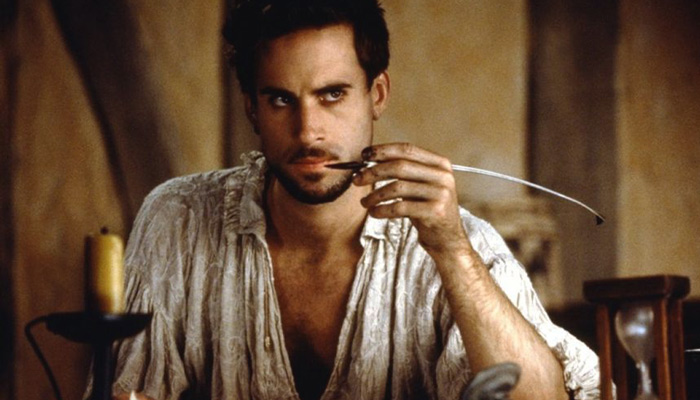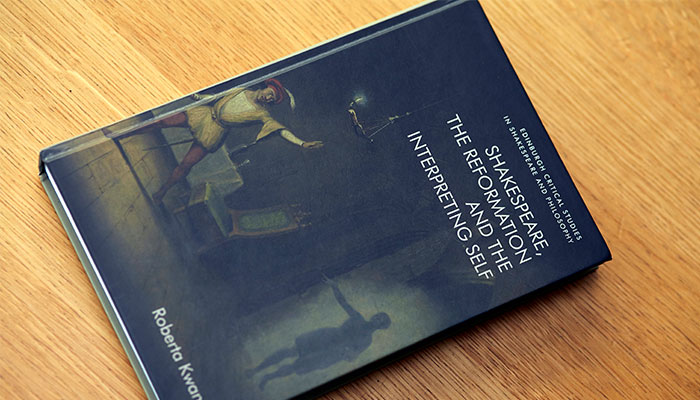School’s back, and so too is Shakespeare. Indeed, Shakespeare is the only author named in the NSW English K-10 Syllabus. Highschoolers must study one of his plays in Year 9 or 10.
Will it be an old favourite, such as A Midsummer Night’s Dream or Romeo and Juliet, or another of the 36 plays collected in Shakespeare’s First Folio? Last year, to celebrate the First Folio’s 400th anniversary, people flocked to libraries and museums to marvel at this 900+ page book that has become one of the most influential works published in English.

Compulsory in the classroom, popular beyond it. Why do we feel that Shakespeare is relevant to us in the twenty-first century?
My book, Shakespeare, the Reformation and the Interpreting Self, explores how Shakespeare seems to get our need to know. His plays speak to our need to know the truth, to know what to do in tricky situations and to know ourselves – as well as our yearnings to be known.
More specifically, I argue that Shakespeare captures our modern (Western) assumption that we know as interpreters of knowledge. That is, we take for granted that who we are and our relations to the people and things we seek to understand function as interpretive filters. These interpretive filters affect how we go about satisfying our yearnings to know, as well as what we think we know.
Modern people are what I call ‘interpreting selves’. And so also, it seems, are Shakespeare’s characters.
I begin my book with Hamlet’s pressing need to interpret and understand himself: ‘Am I a coward?’
Hamlet has met the ghost, the spitting image of his father. Your uncle murdered your father, the ghost claims, before it commands the son to take revenge. Hamlet delays.
Is he chickening out, or is his inaction reasonable, given that he does know his own fallibility as an interpreter and that he does not know if the ghost is telling the truth? This is an urgent question, not only for Hamlet, but also the play’s audience.

Know thyself: Dr Roberta Kwan, pictured above, argues Shakespeare’s characters ask themselves questions that remain universal four hundred years after they were first written. Image: Samantha Christensen
Can we pin responsibility on Hamlet as a free human agent who should be able to make sense of himself and his situation, and know how to act? Or is he so subject to forces beyond his control that we should absolve him of blame? This issue of human responsibility is, of course, all too familiar today. Time after time we ask similar questions about real life interpreting selves, questions that often provoke judgements that land uncompromisingly on one side or the other.
I argue that we can gain some insight into why Shakespeare’s plays feel relevant to our own circumstances and concerns by tracing the modern interpreting self back to events of Shakespeare’s own age. These events centred on what many people consider the most influential book published in English: the Bible.
For most sixteenth-century people, the Bible contained knowledge of ultimate importance: knowledge of God and knowledge of oneself. But who was authorised to access, read and interpret the Bible?
All people, not just the authorities within the Roman Catholic Church, the Protestant Reformers (think Thomas Cranmer of Wolf Hall fame) insisted. Cranmer and co also overturned prevailing ideas about how much agency humans have when it comes to knowing God and oneself. The Reformers’ campaign split the West in two. It also meant that individuals, including Shakespeare, could own, read and interpret the Bible for themselves.
It’s hard for us to grasp how culture-changing these events were. But their legacy includes Shakespeare’s interpreting selves and our own assumption that we are interpreters of knowledge.

That’s not to say that we can neatly map today’s interpreting self onto the Reformers’ version. My explorations of the complex ways that Shakespeare interacted with the Reformers’ ideas show that these ideas sometimes affirm modern thinking about who we are. But sometimes they challenge our beliefs, especially when it comes to the big question of human agency.
Which brings us back to Hamlet. Is he answerable for his (mis)interpretations and their consequences? I argue that Shakespeare and the Reformers would answer neither ‘absolutely yes’ nor ‘absolutely no’. Rather, they would urge us to adopt an empathic interpretive stance that acknowledges just how difficult it is for Hamlet, and for us, to know.
Dr Roberta Kwan is an Honorary Postdoctoral Fellow in the Department of Media, Communications, Creative Arts, Language and Literature.
Shakespeare, The Reformation and the Interpreting Self is published by Edinburgh University Press.







